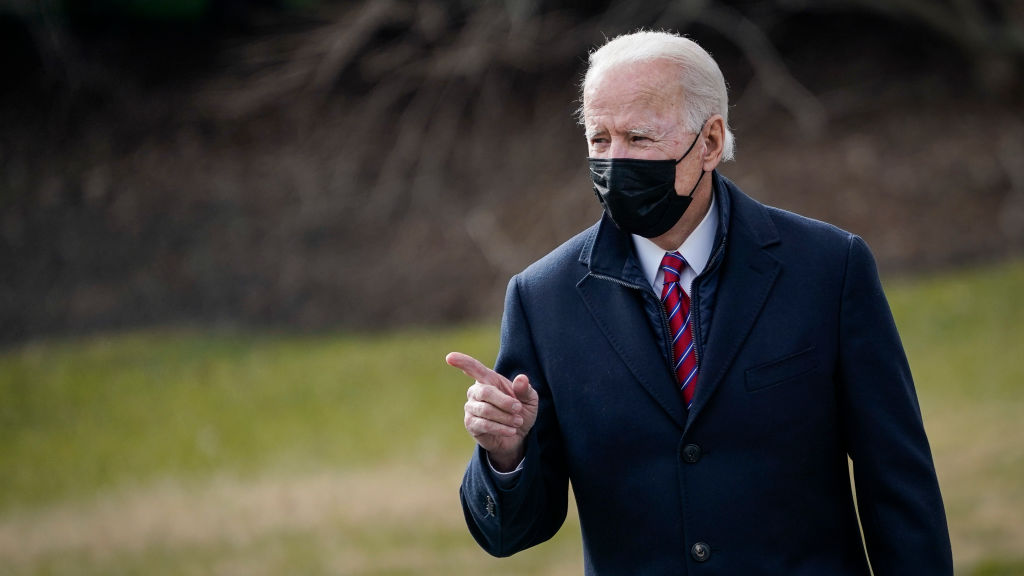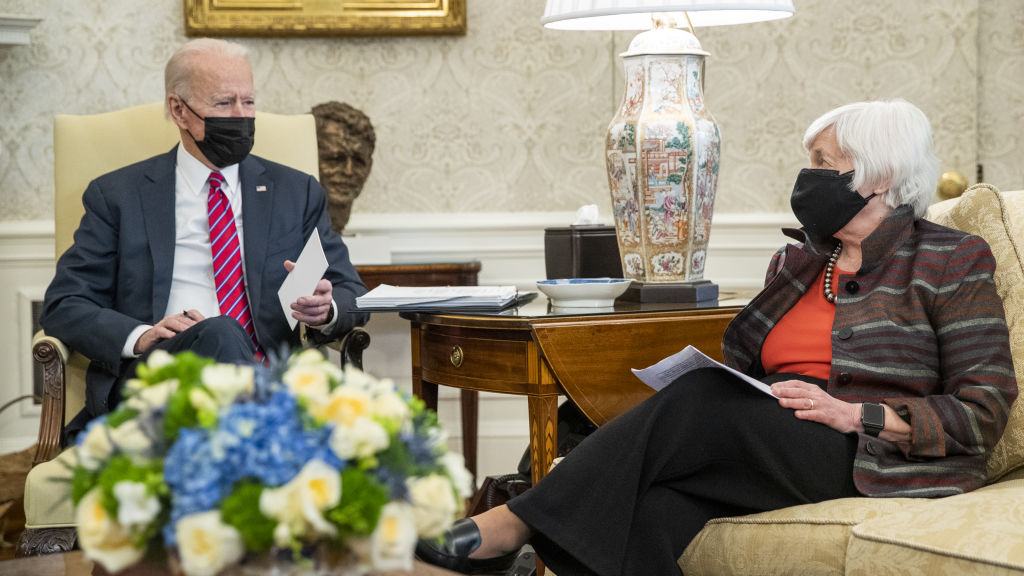
U.S. President Joe Biden walks to Marine One on the South Lawn of the White House in Washington, D.C., January 29, 2021. /Getty
U.S. President Joe Biden walks to Marine One on the South Lawn of the White House in Washington, D.C., January 29, 2021. /Getty
Editor's note: Keith Lamb is a University of Oxford graduate with an MSc degree in Contemporary Chinese Studies. His primary research interests are China's international relations and "socialism with Chinese characteristics." The article reflects the author's opinions and not necessarily the views of CGTN.
Trump's America First policy which sparked the trade war with China was sold to the American worker as a zero-sum battle in which victory would lead to increased living standards. U.S. tariffs on Chinese imports now average at 19.3 percent which is 7 percent higher than before the trade war started.
These measures were justified on the grounds that more jobs would be created. However, it is generally accepted that any gains seen in certain sectors of the U.S. economy have been offset by losses elsewhere. For example, tariffs on washing machines did bring some jobs to the U.S. but conversely drove up the price of a dryer by $92. The organization Tariffs Hurt believes that, even without considering retaliatory tariffs, the U.S. trade war costs Americans $810 every second.
The fact is little manufacturing moved back to the U.S. In our world of complex interlocking supply chains, many consumer items are merely assembled in China. As such, it was always going to be off the mark singling out China for America's economic woes. Factory owners, seeking to escape U.S. tariffs, simply shifted production to other developing countries in Southeast Asia.
However, this trend was already in place and Trump merely hastened this impetus. China's upgraded manufacturing strategy has for some time been moving lower-cost production and labor-intensive industry abroad to allow China to concentrate on advanced manufacturing.
Maybe tariffs were always less about the American worker and more about hindering China's rise. However, China's economy has proven robust to external pressure. Even with COVID-19, while other economies remain in the doldrums China's economy, according to the IMF, is projected to grow 8.1 percent this year.
China's resoluteness when it comes to dealing with external threats should have been learnt long ago. The 2008 economic meltdown which started in the U.S. barely impacted China. Unlike smaller countries, which rely on the U.S. market, China's vast internal market as demonstrated by its recent dual circulation strategy is enough to shield itself from U.S. economic pressure.
With all this in mind, Biden must firstly re-evaluate the U.S. zero-sum economic strategy towards China and secondly, he must examine the actual causes for the perceived decline in the U.S. worker's conditions.
According to Pew research, American living standards, based on purchasing power, have been stagnant since 1964, well before China opened up to the world. Thus, Trump's claim of America being in a zero-sum game where China's gain is America's loss doesn't hold true. In fact, when it comes to the U.S. there is no lack of wealth and no lack of possessions. The problem is that the very basics in life are not provided by the American system.
Consumers are weaned on credit leading to a lack of savings; health care is unaffordable; the U.S. diet, replete with junk food, fattens up its citizens but nutrition is lacking; poor public transport means even the poor are forced to buy a car. On top of all this, class and racial divisions add to making progress difficult while the culture of extreme individuality negates the solidarity and safety net of the extended family.
Notably, none of these aforementioned problems are China's fault. Nevertheless, with the abundance of wealth in America combined with a relatively small population all the aforementioned problems are solvable by Americans themselves. However, whether U.S. neoliberal transnational capital, who Biden represents, will have the fortitude to seek change is the real question.

President Joe Biden speaks with Janet Yellen, treasury secretary, during a meeting in the Oval Office of the White House in Washington, D.C., U.S., January 29, 2021. /Getty
President Joe Biden speaks with Janet Yellen, treasury secretary, during a meeting in the Oval Office of the White House in Washington, D.C., U.S., January 29, 2021. /Getty
IMF figures show that when looking at economic primacy in terms of GDP at purchasing-power parity the U.S. has kept pace with China. However, China's population of 1.4 billion has seen significant improvements in their living standards compared to 320 million Americans who have not. Evidently then, there is a block when it comes to the redistribution of wealth in the United States.
It is this block, rather than blaming China, which Biden needs to work on. However, will Biden be able to do so? Neoliberal capital, which is footloose from the state, generally sees the state and its citizens as its own plaything rather than something it has the responsibility to help.
They will simply move to wherever is most profitable for them. Under the logic of capital accumulation, they will also stash their profits away from state taxation which could be used to fund the social projects needed to solve U.S. problems.
As such, it is a big task to expect the class interests Biden represents to look beyond their own limited interests and be conscious of the wider picture when it comes to the plight of the American worker.
Nevertheless, when it comes to China, Biden must firstly work out a new post-Trump economic deal that is cognizant of the deficiencies that lie within the U.S. itself. Secondly, if tariffs, which go against the multilateral rules set out by the WTO, have not had the desired effect and indeed if the reasoning for the tariffs was faulty from the start then they must be re-evaluated.
Importantly, Biden must drop Trump's zero-sum strategy once and for all. America First should mean putting American citizens' well-being first rather than finding excuses to shift blame for internal issues abroad. In part, this means dropping ideological grievances with China which in the pre-Trump era never proved a barrier to beneficial economic cooperation.
(If you want to contribute and have specific expertise, please contact us at opinions@cgtn.com.)

